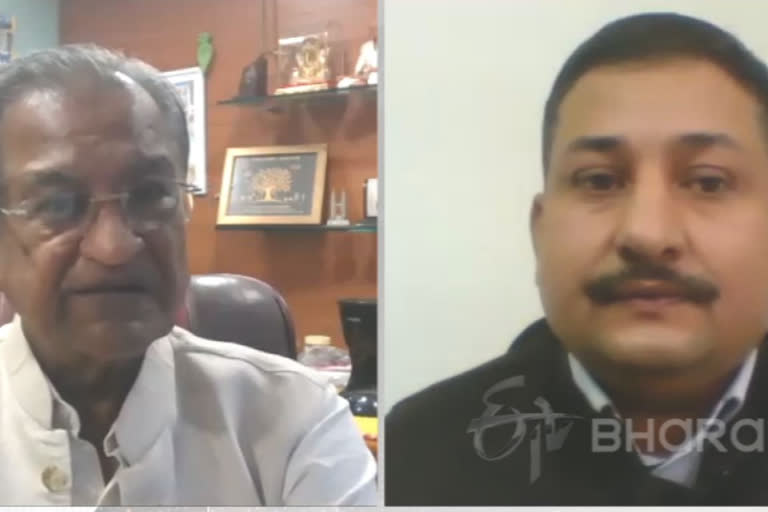New Delhi: Nearly three-month long farmer’s agitation in Punjab had hit the cargo movement and dented the country’s exports as agitating farmers blocked trains, roads and truck movement but the situation has improved in the last few weeks as cargo has started moving, said head of Indian exporter’s organisation in exclusive interaction with ETV Bharat.
“Initially the impact was very high, they stopped the trains, roads and trucks but fortunately the good sense prevailed and transportation started and the cargo is moving out. The imported cargo is also moving in,” said Sharad Kumar Saraf, President of Federation of Indian Export Organisations.
Saraf said three days back the Railways agreed to move the empty containers from ports to inland depots which is a positive step.
“Now we are not so badly affected by farmer's agitation,” Saraf told ETV Bharat.
Saraf, who last week attended a pre-budget consultation meeting with the finance minister Nirmala Sitharaman as part of a pre-budget consultation, says exporters are passing through a difficult time due to the outbreak of Covid-19.
“We are facing challenges at various fronts and unless the government comes out with some tangible policies and support system, the export will continue to decline the way it is,” he said.
Saraf says the country’s exports are stagnant at around $330-335 billion for the last three years, which is at around 16% of the GDP whereas for a country like India, the share of exports in the country’s GDP should be at around 25 percent.
In the meeting with Sitharaman, exporters demanded that they should be given a duty-free slip equal to 10% of their export turnover for research and product development for overseas markets.
READ: Budget 2021-22: Government should lead from the front in spending, says expert
Exporters face GST woes
Saraf said the exporters also raised the issue of delayed GST refunds and action against exporters like freezing of bank accounts or delay in GST refunds due to minor errors and without proper investigations.
“We also raised the issue of ease of doing business for exporters, bank accounts are frozen, GST is stopped, a container goes to port and it is marked as 'risky'. Now imagine your 12-18% GST is stopped so your all the cash flow is completely stopped,” Saraf said.
The FIEO also demanded roll back of the decision to cap the benefits of MEIS (Merchant Export from India Scheme) to Rs 2 crore per exporter.
In September this year, the government capped the export incentives given under the MEIS scheme to Rs 2 crore per exporter on outbound shipments made during the September-December period.
“There cannot be any cap on this. If I have given Rs 100 to the government as duties then the government should give me back Rs 100 as duties can't be exported,” Saraf explained.
In response to a question by ETV Bharat whether finance minister Nirmala Sitharaman has enough fiscal room to accept the demands put forward by exporters, Saraf said the exporters are not asking for anything special.
“What we have asked for the refund of duties that we have paid, and in case of R&D have asked for custom duty remission that is not something that the government is going to give from their pocket,” said the FIEO President.
“We can export goods and services, we cannot export taxes. It's impossible to be competitive,” Saraf observed, adding that it doesn't happen this way in Europe and China.
READ: Sensex tanks 1,407 pts as new COVID-19 strain in UK triggers global selloff
Declining export
Saraf blames multiple factors behind the decline in India’s merchandise and services export in the current fiscal. India’s exports registered a decline of 8.74% in November in comparison with the exports during the same month last year, while the decline in exports for April-November period has been estimated over 14% during the same period of the last fiscal.
“Decline in exports is understandable as there is a general decline in global trade due to Covid pandemic. The other issue is that severe shortage of empty containers for 3-4 months, and substantial increase in the freight rate, have gone up by 40-80% in the last several months, which is very abnormal,” Saraf said.
Saraf said due to these factors and rising cost of manufacturing, India is not able to take advantage of anti-China sentiments in the West.
The FIEO President said that due to the high cost of freight, India’s commodity exports have become non-competitive in the global market.
Pre-Covid level possible only in 2022
He says the situation will not improve before March next year and Indian exports may register an annual decline of 12-15% in the current fiscal.
"If we catch up in the fourth quarter then our exports may be down by 10%, otherwise the decline in exports will be 12-15%," he said.
“We may not be able to do even $300 billion in this fiscal and a return to pre-Covid level will be possible by March 2022,” Saraf told ETV Bharat.



